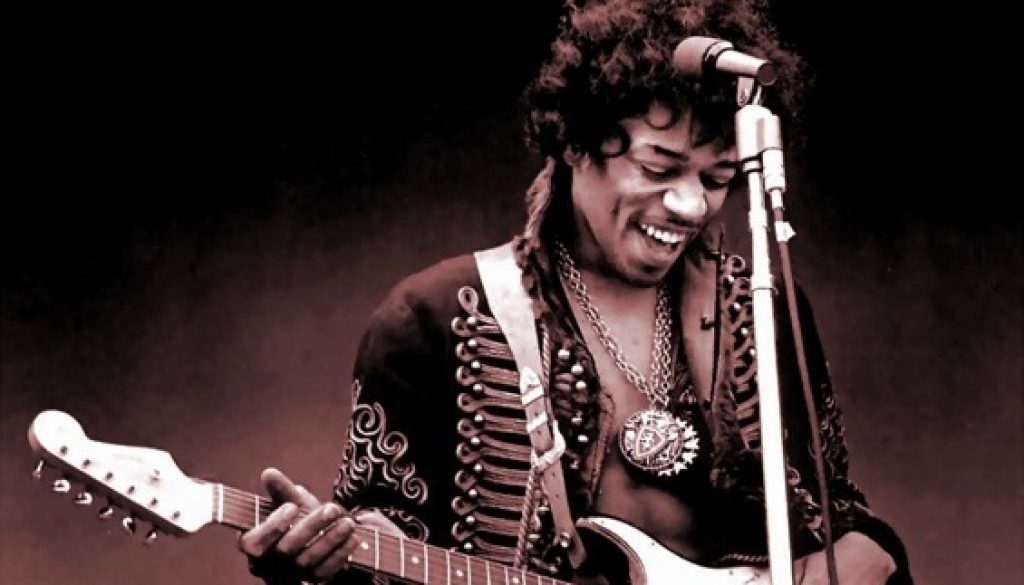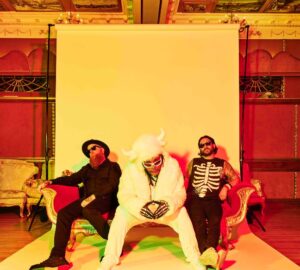In the wake of the protests in the US and political unrest the world over, we at Bring the Noise UK wanted to shine a spotlight on some of the best Black musicians in music. We are going to do this in a series of articles, this first one being about legends throughout history. This article goes through music history, starting in the 1930s, and names some of the most influential and important Black artists to whom we owe so much. Watch out for part two, coming soon!
Robert Johnson
More myth than material, this legend is widely credited for the popularisation of the blues with his landmark recordings in 1936 and 1937, which only led to success after his death. Tragically lost aged 27, the myth that Johnson sold his soul to the devil at a crossroads, for the ability to play guitar and become a blues legend, has now passed into the mythological tapestry of music folklore. The exact location of his gravesite is unknown, and little is known about his life and his creative process other than these two recording sessions, which nevertheless changed the musical landscape forever.
Sister Rosetta Tharpe
If you like rock music, you owe this woman your music taste. She was originally a gospel singer, but one who made it to number two on the “race records” charts. She was a pioneer in guitar techniques, often found competing in (and winning) guitar battles at the Apollo. The incorporation of swing rhythms in her music was a precursor to rock ‘n’ roll, and therefore everything we put on our site today has this woman to thank! Johnny Cash, Elvis, Chuck Berry and Little Richard all count this woman amongst their influences. If you want to find out more, there was a documentary which aired on the BBC in 2011 all about this incredibly influential woman!
Little Richard
Another Black artist who helped carve out the genre of rock ‘n’ roll which we know and love today, Little Richard was known for his showmanship and piano-led songs which laid the foundations for other genres such as soul and funk as well. He was mostly active in the 50s, and his live performances also led to a lot of the integration between Black and white audiences who both came to enjoy his energetic and exciting new sound.
Chuck Berry
Whaddya know, the man who invented the concept of guitar solos was also Black? Chuck Berry was active around the same time as Little Richard, but instead of focusing on showmanship through rasping vocals and energetic vocal performances, Chuck Berry let his guitar do most of the talking. His innovations in rhythm and blues has led to him being named by many as the Father of rock and roll. Berry’s Johnny B Goode is also the only rock ‘n’ roll song on the Voyager Golden Record.
Jimi Hendrix
A man who needs no introduction. Taken from us, again, tragically young, it may be tempting to fall into imaginary worlds in which Hendrix didn’t die aged 27 and continued making music and getting bigger. As it is, we have an incredibly small discography, but one which is perfectly formed – from the days of Are You Experienced onwards, the man did not really release a dud song, and had time to put his own spin on the American National Anthem as well. A truly timeless hero of rock and roll, and now an immortal legend.
Rotary Connection
The band with whom Minnie Riperton first found fame are a relatively unknown Black psychedelic rock group. They are mostly known as a result of Riperton’s later fame, but also for their incredible song, I Am The Black Gold of the Sun, which is a near-religious expelling of Black pride and celebration. (They also released possibly the only psychedelic Christmas album, which features a song about a stoned Santa Claus – this one is less essential but still a very fun fact. The album is called Peace and it’s on YouTube if you want to check it out).
Love
Fronted by the crazy musical genius Arthur Lee, Love were one of the most influential American rock bands of the 60s. Whilst they only achieved moderate success in the charts compared to their contemporaries (ie the Pink Floyd‘s and Doors of the era), their album Forever Changes is still considered a masterpiece to this day, and their mixing of folk rock, hard rock, blues, jazz, flamenco, mariachi and orchestral pop was truly ahead of its time.
Funkadelic
Along with Pavement, Funkadelic was a massive musical project which featured a whole host of musicians of colour (most notably Eddie Hazel and Billy Bass Nelson). Both projects were led by George Clinton, and are widely considered responsible for pioneering funk music in the 1970s. Funkadelic mixed these funk elements with heavier elements of psychedelic rock and grooves, with hit albums considered essential classics in rock history, such as Maggot Brain and One Nation Under A Groove.
Death
Largely credited as one of the first ever punk groups, Death received next to no critical acclaim when they formed in the early 60s. Their music was always political, such as single Politicians in my Eyes, and was more raw and abrasive than other rock groups around at the time. Due to the anti-establishment nature of the band’s name and their music/image as a whole, this band became an absolute underground myth until they were rediscovered in 2009, by Drag City Records, who combined the seven songs from the Death recording sessions in an LP titled …For The Whole World to See, which is now available on Spotify.
X-Ray Spex
Before Bikini Kill, before Sleater Kinney, there was X-Ray Spex. One of the definitive bands of the early punk scene, X-Ray Spex was fronted by Poly Styrene, a woman with a voice that was “powerful enough to drill holes through sheer metal”. Whilst not achieving much success during their initial career run, their breakout single Oh Bondage, Up Yours! is now considered an essential punk record.
Bad Brains
On influence alone, Bad Brains are incredibly important. They are in part responsible for what heavy music sounds like now, and widely considered pioneers of hardcore punk, although they also combine funk and reggae into their all-encompassing sound. Every recording captures the energy and raw anger of a band fighting against the industry. [NB; this band has also been tied up, unfortunately, in a lot of homophobia, which we obviously do not condone in any way. To find out more, take a look at this Afropunk article, from a queer Black Bad Brains fan HERE.]
The Selecter
Pauline Black created musical change with the Ska band she fronted. The Selecter were instrumental in the two-tone movement and are still an incredibly important voice. The political songwriting and incredible ability to write a catchy chorus have inspired generations.
The Specials
The two-tone movement was and continues to be important in the fight against racism. With their recent comeback album the band again continued to push back against racism. Their infectious combination of deadpan vocals and infections Caribbean sounds combine perfectly with the fury of punk.
See also: Neville Staple, Pama International, The Special Beat and Fun Boy Three.
Grace Jones
Without Grace Jones, we wouldn’t have Lady Gaga. We wouldn’t have Rihanna, or Annie Lennox, or so many other avant garde pop acts. She’s not strictly rock or metal, but her rockstar quality is inarguable. She also made a stand for queer Black artists, and was one of the first to do so. We owe her so much, and her song Pull Up to the Bumper is a staple on any PRIDE playlist, so turn it up!
Living Colour
Formed in New York City in the 1980’s by guitarist Vernon Reid, Living Colour went on to have a Platinum album in the US with 1988’s Vivid, anchored by the hit single Cult Of Personality. That’s not to say that was their only great song, as Vivid was jam-packed to the eyeballs with soulful, funky, hard riffing socially conscious anthems like Open Letter (to A Landlord), Funny Vibe and Which Way To America?. All of these songs wouldn’t pack half the power they do without the jaw-droppingly powerful vocals of Corey Glover, who puts on a clinic every time. The follow up records, 1990’s Time’s Up and 1993’s Stain, continued the creative excellence, touching on subjects like police brutality with Someone Like You, information overload and the guilty conscience that folks may have about the world being assuaged by charity. Forgive us for using the old cliche of “this is more relevant than ever” but in the case of songs like Someone Like You, its tragically so. Though the band broke up in 1995, they returned a few years later and remain a potent creative and live entity, with 2017’s Shade record being the highlight of their return so far. Reid was also one of the founders of the New York based Black Rock Coalition, an organisation of whom a goal was to re-establish that rock music came from black culture.
King’s X
Christianity, rock music and Blackness may have seemed like an odd mix in the 1980’s where hair metal reigned supreme, but it’s stuff like this that lends itself to unique, beautiful music, and that description can certainly be used to describe Missouri trio King’s X. The group created a beautiful blend of gospel and soul inspired lead vocals from either bassist Dug Pinnick or guitarist Ty Tabor, and powerful triple vocal harmonies and progressive grooves anchored by the tight drums of Jerry Gaskill. The band found themselves beloved by the press and other musicians, Jeff Ament from Pearl Jam even declaring “King’s X invented grunge” in an interview with MTV. Debut album Out Of The Silent Planet found itself topping Kerrang!’s album of the year list in 1988. Sadly, it never translated to the mainstream success one would have assumed was coming. What cannot be denied is that the fanbase they have cultivated is utterly devoted. Songs like In The New Age, with its outrageous guitar solo and shuffling groove, powered by the absolutely monstrous bass tone and the peerless, borderline transcendent Goldilox, would have got them to at least the same heights as Living Colour. After Dug Pinnick came out in 1998, the Christian music community abandoned the group, and Pinnick walked away from the church entirely, a fact most pointedly displayed on the 2005 song Get Away from the brilliant Ogre Tones record. Even at his most disappointed, he still finds the time to write in a gorgeous three-part harmony there too. The trio remain active to this day, with their unique sound leaving behind a legacy as one of the great “musicians band” bands, a point subtly nodded to by their music being played by the Paul Shaffer band, after ad breaks on the Late Show with David Letterman.
Sepultura
You’d think that having two of your founding members leave your band would ruin your career altogether. That is not the case for these Brazilian thrashers, though. Following Max Cavalera‘s departure, Derrick Green‘s arrival in 1998 allowed Sepultura to continue putting out music and performing around the world, with their most recent release, Quadra, released last February. When you take into account that Green has now been in the band for as long as both Max and Igor Cavalera were during their respective stints, one thing becomes immediately clear: the American vocalist is here to stay for good.
Skunk Anansie
The importance of Skunk Anansie in carving out a space for Black women in the rock/metal scene back in the 90s can really not be overstated. With their first album, Paranoid and Sunburnt, vocalist Skin tackled issues of Black femininity, the role of tradition and family values in passing down racist beliefs, and even the commercialisation of Christmas, all in the same LP. It’s a remarkable debut which was followed by many more amazing albums. The band celebrated their 25th anniversary with the release of a live compilation, and we hope they’ll be back for more releases soon!
God Forbid
It goes without saying that the New Wave Of American Heavy Metal of the late 1990s and early 2000s helped to shape the state of heavy music going forward. One band that helped push the genre bending sound of metalcore forward was the New Jersey natives God Forbid. The band found a way to meld heavy, intricate music with vocal work that was both savagely aggressive and soulfully melodic in equal measure. Despite the band’s deformation in 2013, they have remained an important influence to many young bands and their 2005 album, IV: Constitution Of Treason, is an album that will stand up against any of the modern greats and should be held in high regard by any self-respecting metal fan.
Rage Against the Machine
Political unrest in the 90s was pretty much characterised by this band and their controversial lyrics, speaking out about police brutality and anarchy at a time when no one else was, leading the LAPD to fire rubber bullets during one of their protest performances. No list like this would be complete without Rage Against The Machine and the musical landscape today certainly wouldn’t be the same without them.
Death Grips
Described by Wikipedia as an “experimental hip hop band”, Death Grips actually far transcend barriers of musical genre, to create a wholly abrasive and provocative noise which draws on punk rock, noise, industrial and electronic elements. A unique musical project which remains relatively enigmatic, Death Grips have had an incredibly successful impact in a relatively short period of time. The group is known for their erratic performance style and MC Ride’s bleak and cryptic lyrics, resulting in a truly bizarre experience for anyone who manages to catch them live. They have also collaborated with Bjork and remixed some of her tracks. This band/collective show there is real talent to making such an almighty racket. Amongst the crushing beats, and often uncomfortable combinations of digital and analog instruments, are vocals strong enough to overpower the largest walls of noise.
Skindred
A unique melting pot of heavy metal, ska, punk, regga and dub, Skindred were formed in Wales and are fronted by the insanely charismatic Benji Webbe. They are constantly named Best Live Act by a variety of publications and are still going strong 20+ years into their career.
Keep an eye out for part two of this feature, which will highlight some of the greatest Black musicians in the current music scene today, some of whom you will know and some you won’t! Thanks for reading and please remember to educate yourself, keep spreading the word and practice anti-racism everyday.
Want to help the cause? Here’s a document with a list of places to donate to and petitions to sign, as well as some PDFs of useful books to educate yourselves further: https://docs.google.com/document/d/1-0KC83vYfVQ-2freQveH43PWxuab2uWDEGolzrNoIks/mobilebasic?fbclid=IwAR0FlY3euYo5_guY82SH_mwv7xuMrtQBk-LUKjpqkEFzo2gQqNODojn6ZPM





